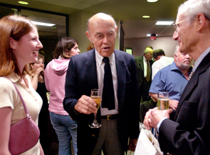According to John Corporon, past news director for WDSU-TV in New Orleans, the future of television news is a grim one. The popularity of infotainment has risen so dramatically in recent years that he said he hardly recognized the field he had once pioneered in New Orleans.
He was not alone. Three figures in the history of southern media, Bill Monroe, Ed Planer and Corporon, spoke about their careers, experiences and insights such as these last Tuesday at a panel entitled “Founding Fathers: The Past, Present and Future of TV News.” Monroe, Planer and Corporton are all past news directors of WDSU.
The three were introduced by New Orleans Press Club President Dominic Massa, University President the Rev. Kevin Wildes, S.J., and Associate Professor Nancy Dupont. The evening was moderated by longtime anchorman Norman Robinson.
Robinson credited the founding fathers with “providing the template for news… with journalistic integrity.”
The event’s timing coincided with the birthday of the late A. Louis Read, known in the South for helping WDSU become a success, and with this week’s communications department reunion.
Corporon spoke of WDSU’s devotion to news and not entertainment, a quality he attributed to Read and Edgar B. Stern, Jr. Corporon first came to New Orleans in 1955, working as a reporter for United Press. He was hired by Bill Monroe and became the station’s Washington D.C. correspondent. WDSU was the first locally-oriented station in the country with its own D.C. reporter. Coproron became news director in 1961.
When queried on the quality of television news today, Corporon said it had severely degraded.
“It’s all guts, death, and celebrities now” he said. “It lacks serious analysis.”
Corporon also said that, although news programs are easy to find on TV at nearly any time of day, almost no news if of substance.
“With cable there’s more than enough [news programming], but it’s low-quality. And network news doesn’t spend enough time on it.”
Planer agreed, saying that one should no longer expect world news from local television.
“That’s what a newspaper is for,” Planer said.
Planer became director in 1966. He covered state and local politics, and the civil rights struggle in the South. Planer went on to become news director at WMAQ Chicago in 1972 and was eventually named a vice president at NBC News in charge of the network’s daily news coverage of Europe, the Middle East, and Africa.
Monroe said he originally did not want to get into television; he found it “not ethically satisfying enough.”
Looking back, Monroe said he realized just how wrong he was on the subject. In the past, he said, the climate for television news fostered ethics and broadcasting was a satisfying job.
Monroe, a native New Orleanian and Tulane, alumnus began his career in print journalism with United Press and the New Orleans Item. Monroe then moved to television when he was hired as news director for WDSU-TV. He told the crowd that he was actually the second news director, hired after the first one was arrested, although he did not recall the crime.
On the future of television news, Monroe predicted that the three major reporters of network news – Dan Rather, Peter Jennings and Tom Brokaw – would retire soon, and doubted that their replacements would lack the integrity of their predecessors.
On the subject of Rather’s hasty reporting of the documents questioning President Bush’s military record, Monroe said he would have still reported on the documents existence but would also have taken the time to verify their authenticity. Monroe also said the election was still months away, and Rather and his team should have taken the time to check their sources.
Planer questioned the fact that Rather was too busy apologizing for the premature report, instead of tracking down the person responsible for forging the documents in the first place.
During the question and answer segment of the program, the men did recognize that sometimes it is hard to know what to do in pressing reporting situations. Two of the three directors had received threats on their lives during the course of reporting on desegregation of southern schools.
Ian Siparsky can be reached at [email protected].







